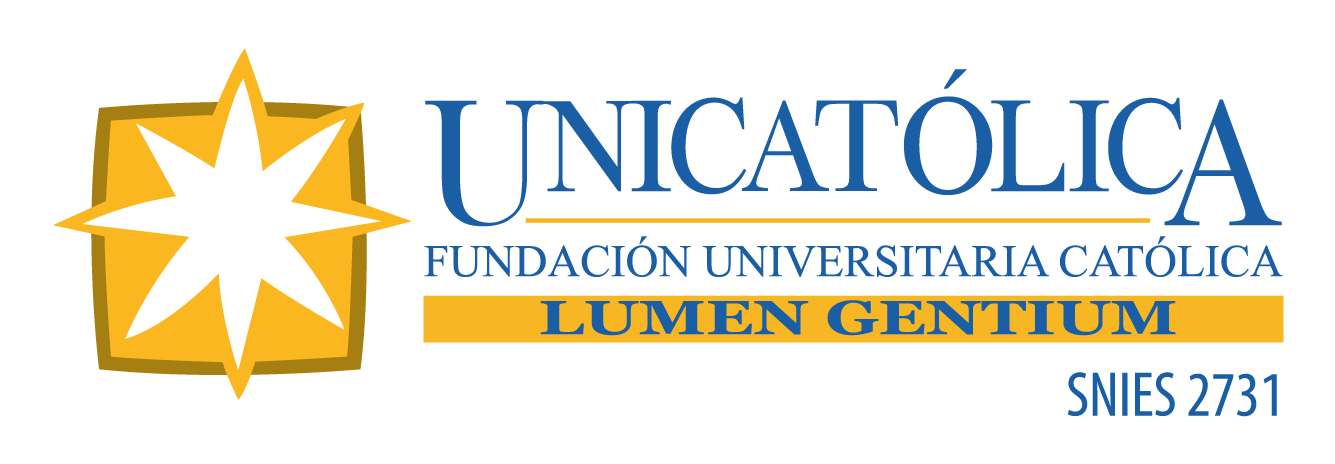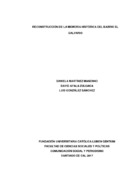Mostrar el registro sencillo del ítem
Reconstrucción de la memoria histórica del barrio el calvario
| dc.creator | Martínez Manzano, Daniela | |
| dc.creator | Ayala Zuluaga, David | |
| dc.creator | González Sánchez, Luis | |
| dc.date.accessioned | 2018-05-18T23:00:17Z | |
| dc.date.available | 2018-05-18T23:00:17Z | |
| dc.date.created | 2017 | |
| dc.identifier.uri | http://hdl.handle.net/20.500.12237/933 | |
| dc.description | La presente investigación buscó reconstruir la memoria histórica del barrio El Calvario. Esto debido a que se identificó que el material informativo o de consulta referente a la historia de este sector de Cali se centra solamente en los problemas que se presentan en este, dejando de lado todo el recorrido histórico del mismo. Es por ello que surgió el interrogante de ¿cuál es la importancia que representa para los caleños la reconstrucción histórica del barrio El Calvario? Para el desarrollo de este trabajo, se investigó principalmente sobre lo que significa reconstruir memoria histórica. Después de esto, fue importante consultar sobre otras categorías que se dan en el marco de esta investigación como lo son: pobreza, marginación, dignificación, habitante de calle, otredad, identidad, desarrollo, entre otras. Asimismo, se contó con el aporte de diferentes investigaciones que sirvieron para reforzar el contexto propio del presente proyecto y contribuir con este a la reducción del estigma que ha tenido El Calvario durante tantas décadas, además de generar conocimiento sobre la transformación que ha tenido este sector de la ciudad. Durante la realización de este proyecto se consideró importante trabajar en el margen de tres aspectos: la identificación de causas sociales que marcaron la historia del barrio El Calvario, el reconocimiento de causas culturales y políticas, y la importancia que representa el evocar memoria en procesos de reconstrucción histórica. En el transcurso de este proceso los métodos utilizados fueron: la observación de las dinámicas sociales, culturales, económicas y políticas que allí se llevan a cabo, el acercamiento a fundaciones que permitieron el contacto directo con las personas que viven en El Calvario, la participación en jornadas como las ‘chocolatadas’ promovidas por la fundación Samaritanos de la Calle que fueron importantes porque en ellas se pudo recorrer lugares del sector de difícil acceso y reforzaron los vínculos del grupo investigador con los habitantes del barrio. También se realizaron múltiples entrevistas a líderes comunitarios, habitantes del sector, directores de fundaciones y entidades gubernamentales. | spa |
| dc.description.abstract | The present investigation sought to reconstruct the historical memory of El Calvario neighborhood. This is due to the fact that it was identified that the informative or reference material referring to the history of this sector of Cali focuses only on the problems that arise in it, leaving aside all the historical history of it. That is why the question arose: what is the importance of the historical reconstruction of El Calvario neighborhood for Cali? For the development of this work, it was investigated mainly on what it means to reconstruct historical memory. After this, it was important to consult about other categories that are given in the framework of this research such as: poverty, marginalization, dignity, street dweller, otherness, identity, development, among others. Likewise, it counted on the contribution of different investigations that served to reinforce the own context of the present project and contribute with this to the reduction of the stigma that The Calvary has had during so many decades, besides generating knowledge on the transformation that this sector has had from the city. During the realization of this project it was considered important to work in the margin of three aspects: the identification of social causes that marked the history of the El Calvario neighborhood, the recognition of cultural and political causes, and the importance of evoking memory in processes of historical reconstruction In the course of this process the methods used were: the observation of the social, cultural, economic and political dynamics that take place there, the approach to foundations that allowed direct contact with the people living in El Calvario, the participation in days such as the 'chocolatadas' promoted by the Samaritanos de la Calle Foundation, which were important because they were able to cover places in the sector that were difficult to access and strengthened the links of the research group with the inhabitants of the neighborhood. Multiple interviews were also conducted with community leaders, residents of the sector, directors of foundations and government entities. | eng |
| dc.source | instname:Fundación Universitaria Católica Lumen Gentium | |
| dc.source | reponame:Repositorio Fundación Universitaria Católica Lumen Gentium | |
| dc.subject | Memoria histórica | spa |
| dc.subject | Habitantes de calle | spa |
| dc.title | Reconstrucción de la memoria histórica del barrio el calvario | spa |
| dc.type | info:eu-repo/semantics/bachelorThesis | |
| dc.subject.subjectenglish | Historical memory | eng |
| dc.subject.subjectenglish | street dwellers | eng |
| dc.rights.accessRights | info:eu-repo/semantics/openAccess | |
| dc.creator.degree | Comunicador Social - Periodista | |
| dc.publisher.program | Comunicación Social y Periodismo | |
| dc.type.spa | Trabajo de grado | |
| dc.type.hasVersion | info:eu-repo/semantics/acceptedVersion | |
| dc.publisher.department | Facultad de Ciencias Sociales y Políticas |

